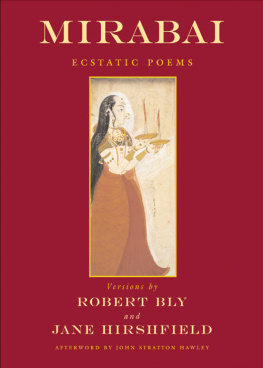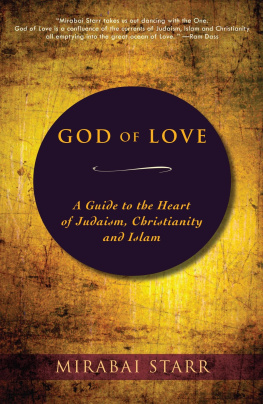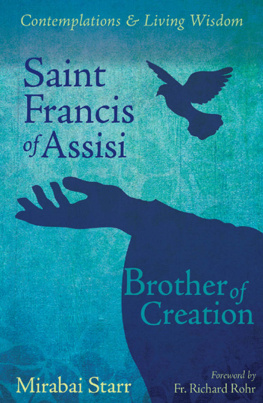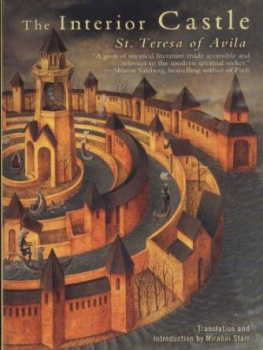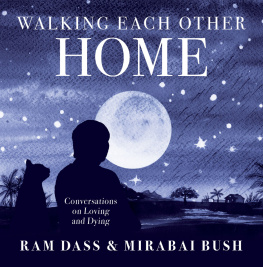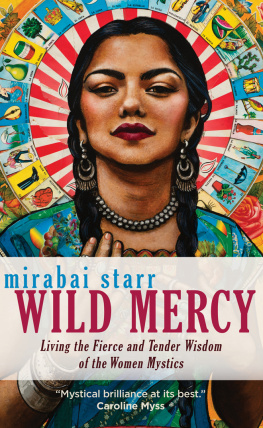Mīrābāī - Mirabai: Ecstatic Poems
Here you can read online Mīrābāī - Mirabai: Ecstatic Poems full text of the book (entire story) in english for free. Download pdf and epub, get meaning, cover and reviews about this ebook. year: 2004, publisher: Beacon Press, genre: Science fiction. Description of the work, (preface) as well as reviews are available. Best literature library LitArk.com created for fans of good reading and offers a wide selection of genres:
Romance novel
Science fiction
Adventure
Detective
Science
History
Home and family
Prose
Art
Politics
Computer
Non-fiction
Religion
Business
Children
Humor
Choose a favorite category and find really read worthwhile books. Enjoy immersion in the world of imagination, feel the emotions of the characters or learn something new for yourself, make an fascinating discovery.
- Book:Mirabai: Ecstatic Poems
- Author:
- Publisher:Beacon Press
- Genre:
- Year:2004
- Rating:3 / 5
- Favourites:Add to favourites
- Your mark:
- 60
- 1
- 2
- 3
- 4
- 5
Mirabai: Ecstatic Poems: summary, description and annotation
We offer to read an annotation, description, summary or preface (depends on what the author of the book "Mirabai: Ecstatic Poems" wrote himself). If you haven't found the necessary information about the book — write in the comments, we will try to find it.
Mirabai: Ecstatic Poems — read online for free the complete book (whole text) full work
Below is the text of the book, divided by pages. System saving the place of the last page read, allows you to conveniently read the book "Mirabai: Ecstatic Poems" online for free, without having to search again every time where you left off. Put a bookmark, and you can go to the page where you finished reading at any time.
Font size:
Interval:
Bookmark:

Selected Titles by Robert Bly
Eating the Honey of Words: New and Selected Poems
The Night Abraham Called to the Stars
The Soul is Here for Its Own Joy:
Sacred Poems from Many Cultures
Kabir: Ecstatic Poems
Selected Titles by Jane Hirshfield
Given Sugar, Given Salt
The Lives of the Heart
Nine Gates: Entering the Mind of Poetry
Women in Praise of the Sacred:
43 Centuries of Spiritual Poetry by Women

Beacon Press
25 Beacon Street
Boston, Massachusetts 02108-2892
www.beacon.org
Beacon Press books are published under the auspices of the Unitarian Universalist Association of Congregations.
2004 by Robert Bly and Jane Hirshfield
All rights reserved
Printed in the United States of America
13 12 11 10 09 8 7 6 5 4 3 2 1
This book is printed on acid-free paper that meets the uncoated paper ANSI/NISO specifications for permanence as revised in 1992.
Book design by Dean Bornstein
Library of Congress Cataloging-in-Publication Data
Bly, Robert.
Mirabai : ecstatic poems / versions by Robert Bly and Jane Hirshfield. 1st ed.
p. cm.
ISBN 0-8070-6387-3 (cloth : alk. paper) eISBN 978-0-8070-9764-9
1. Mirabai, fl. 1516-1546Adaptations. I. Mirabai, fl. 1516-1546. II. Hirshfield, Jane, 1953- III. Title.
PS3552.L9M57 2005
811.54DC22
2004019238
I
The Dancing Energy Came by My House
II
The Ocean of Separation
III
Love Has Come Home with the Rains
Its hard to know where to start with Mirabai. She is outrageous in ten or fifteen ways. With enormous elegance and an exquisite grace, she moves to abandon her upper class family, all the social roles for a married woman of her time, the conservative Hindu religious establishment, and anyone left over who believes in the middle road. Without permission from anyone, she takes on Krishna who, in view of his dark bluish face, could be called the Dark One:
My friend, I went to the market and bought the Dark One.
She assumes that her family would imagine that she slipped into the market area by night.
You claim by night, I claim by day.
Actually I was beating a drum all the time I was buying him.
Some say it wasnt worth it to give up all this power and advantage.
You say I gave too much; I say too little.
Actually, I put him on a scale before I bought him.
She gave away her social position, the warmth of a family, the link with a hereditary ruler of her area, and her right to riches.
What I paid was my social body, my town body, my family body, and all my inherited jewels.
Mirabai says: The Dark One is my husband now.
At this point, she no longer speaks to her family. She turns to Him and says:
Be with me when I lie down; you promised me this is an earlier life.
As soon as we read the first poem by Mirabai, we know we are in the presence of someone who is unworldly. No, someone who is deeply worldly. She knows what this world is like. She married into an aristocratic warrior family. With enormous elegance, she describes how she abandoned her caste, the social roles for a married woman of her time, the conservative religious establishment, and anyone left over who believes in the middle road. Shortly before her own wedding, she insisted on being married to a small statue of Krishna; one might have seen a little trouble ahead in that act. As it turned out, her marriage was brief. Her husband died after three years. She apparently remained living in the castle, threatened by relatives who sent her poisonous snakes. Her teacher, an Untouchable, occasionally came to the small village nearby; she was not to visit him. Apparently she would tie her saris together and climb down the castle wall at night. When she found him, she would wash his old feet and drink the water.
There is no one else exactly like her in the whole history of poetry. Mirabai was born in Rajasthan, India, in 1498, and had a profound influence on the religious life of her time. The intensity of the sort she had appears in every century in India, as it did with Ramakrishna in the nineteenth century. Mirabais genius encouraged thousands of people in her time to compose ecstatic poems and to sing and to dance them. Many villages treasure poems that she is said to have left behind in that town. Her poems are still being sung everywhere in India.
R OBERT B LY
Mirabais love affair with the Dark One has spoken for itself for close to five hundred years. What can be added here? First, reading her words, must be your own eyes, ears, and heart. Millions have memorized and sung the poems of Mirabais passion, each finding in her words some intimate and individual truth, and also some companionship along the path of awakening. To read Mirabai is to awaken more deeply into your own life. In her poems, she calls the Beloved by many names. She names also the listeners and witnesses to her pathFriend, Sisters, Companions, she begins many poems. We are still traveling with her along a northern Indian road lined with dusty palaces and fields awaiting the rains which may or may not come.
Miras poems sing of ecstatic union, and of the despair that ecstatic union, having once been tasted, can then disappear. Her poems sing of what it is like to see through the colors of the world to their single source, and of what it is like to find that this seemingly infinite vision can vanish. Return, she asks the Dark One, again and again, in poems that come in all the colors of the human heart. In this, Mirabais experience is as recognizably grounded in a fully human passion as it is in the realm of spiritual realization. Anyone who has loved beyond reason knows what Mira lived, as anyone who has loved beyond self-interest knows also what Love is.
Mirabai offers in her poems the sheer strength of their beauty, founded in the sharp-edged perception of a person who has opened to her own experience in every dimension. She also offers two central teachings of liberation, each grounded in her fierce and unwavering passion. One is the consummate freedom passion calls up in us, and the other is the surrender of self that passions fulfillment requires. In these two ways, Mira demonstrates over and over, the lover meets fully and intimately the energies of awakening. And through reading her poems, we begin to discover that these two teachings are not separate.
Mirabais freedom comes from taking her seat at the feet of Oneness (for the Oneness found amid multiplicity is what Krishna, in all his many names and embodiments, means) and refusing to budge from that place. Neither the conventions of societal expectation nor the wordsor the desperate actionsof family, friends, or enemies can touch the untouchable self Mira has made through that single act. She has gone beyond caste, beyond personal ego, beyond caring how she is seen. There is something she knows, and it is all she needs to know; or to breathe, to eat, to drink, or lie down with at night. And so she has become a free person, one who can say, I have felt the swaying of the elephants shoulders and now you want me to ride on a jackass? Try to be serious.
Mirabais surrender to the Dark One is similarly complete, and that completeness is the source of her freedoms strength. When you study the lives of mystics, you see that it is not as we might first have imaginednot, that is, a story of seeking and then finding forever. It is harder than that. The experience of oneness comes and goes. And the departureMiras contemporary, St. John of the Cross, famously named it the Dark Night of the Soulis a life-shaking shock. That shock reverberates through many of Miras poems. Look more closely though, and it becomes clear: longing and grief are simply the other face of a love that depends on nothing outside itself, not even its own reciprocation. When the Beloved is present, Mira loves. When the Beloved is absent, she loves. Desire for the Dark One is the sign of his existence. And so, even in what appears to be abject surrender, Mira is free: the one who chooses. The fruit of what comes from this kind of passion, clarity, and fierceness is held in the poems in this book.
Font size:
Interval:
Bookmark:
Similar books «Mirabai: Ecstatic Poems»
Look at similar books to Mirabai: Ecstatic Poems. We have selected literature similar in name and meaning in the hope of providing readers with more options to find new, interesting, not yet read works.
Discussion, reviews of the book Mirabai: Ecstatic Poems and just readers' own opinions. Leave your comments, write what you think about the work, its meaning or the main characters. Specify what exactly you liked and what you didn't like, and why you think so.

